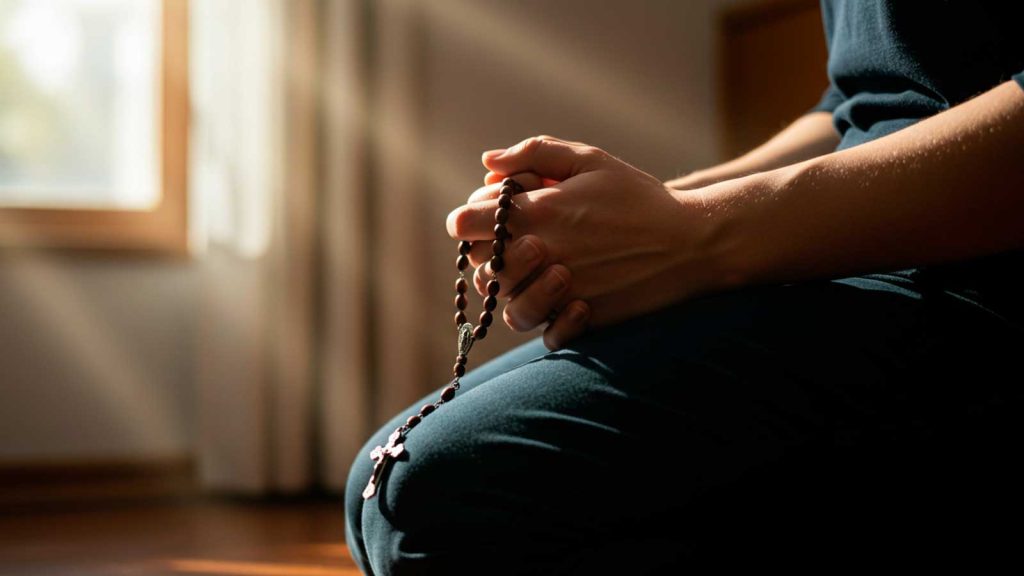The Act of Contrition is one of the most important prayers in the Christian life. It expresses sincere repentance, a plea for forgiveness, and a commitment to follow God’s ways. Many faithful recite this prayer during confession or in moments of personal reflection, seeking to renew their faith and inner peace.
In this complete guide, you will learn the origin, the meaning, and how to pray the Act of Contrition, as well as practical ways to apply it in daily life.
What Is the Act of Contrition
The Act of Contrition is a prayer of repentance said by Christians. Its purpose is to acknowledge sins, ask forgiveness, and promise to avoid sin.
It can be recited individually or within the sacrament of confession, and it is an essential step to strengthen one’s relationship with God.
Main characteristics of the Act of Contrition
- It is a prayer that expresses repentance.
- It can be said daily or during confession.
- It helps renew one’s commitment to God.
- It fosters inner peace and trust in divine mercy.
Origin of the Act of Contrition
The practice of the Act of Contrition has existed for centuries. It was inspired by biblical teachings on repentance and reconciliation with God.
In the early centuries of Christianity, the faithful already used similar prayers to show sincerity regarding their sins. Over time, the Church developed more formal versions that remain to this day.
Biblical influences
The Act of Contrition is related to biblical passages that speak about repentance, such as:
- Penitential psalms, such as Psalm 51.
- The petition for forgiveness in the Lord’s Prayer.
- Jesus’ teachings on mercy and forgiveness.
Why the Act of Contrition Is Important
The Act of Contrition plays an essential role in spiritual life. It helps Christians cultivate humility and draw near to God with sincerity.
Benefits of practicing this prayer
- Draws the faithful closer to God.
- Promotes inner peace.
- Strengthens faith and commitment to the Christian life.
- Prepares the heart for real and lasting change.
How to Pray the Act of Contrition
The Act of Contrition can be prayed in different versions. Below are two well-known forms: the traditional version and a shorter one.
Traditional version
“My God, I repent with all my heart for having offended You, because You are so good and lovable. I promise, with Your grace, never to sin again and to avoid all occasions of sin. Amen.”
Short version
“Lord, have mercy on me, a sinner. Amen.”

Tips to Deepen the Prayer
So that the Act of Contrition is not merely repeated mechanically, it is important to practice it with intention and focus.
How to experience this prayer more fully
- Choose a quiet environment.
- Reflect on your failings before you begin.
- Pray slowly, understanding each word.
- Ask for strength to put change into practice.
When to Pray the Act of Contrition
The Act of Contrition can be prayed at various times, not only during confession.
Some ideal moments include:
- Before going to sleep, as an examination of conscience.
- After realizing a mistake during the day.
- Before longer prayers.
- During the sacrament of confession.
How to Teach the Act of Contrition to Children
Teaching the Act of Contrition to children helps them understand the importance of forgiveness and the Christian life from an early age.
Steps to teach in a simple way
- Use age-appropriate language.
- Explain each part of the prayer with examples.
- Teach little by little to make memorization easier.
- Show that the Act of Contrition helps keep the heart at peace.
The Act of Contrition in Confession
The Act of Contrition holds a fundamental place in the sacrament of confession. It is not merely a formality, but a clear sign that the faithful understands the gravity of their sins and, with humility, seeks reconciliation with God.
This moment of sincere repentance prepares the heart for absolution and renews the commitment to live according to Christian teachings.
What happens during confession
During confession, the faithful follows four main steps:
- Examination of conscience – Reflect on the sins committed.
- True repentance – Feel sincere sorrow for the faults.
- Confession of sins – Tell the priest clearly and honestly.
- Prayer of the Act of Contrition – Acknowledge sins before God and commit to change.
It is in this last step that the Act of Contrition becomes essential. It shows that repentance is not superficial, but deep and purposeful.
Why the Act of Contrition is indispensable
The Act of Contrition is not merely symbolic. It has practical and spiritual functions that make the confession complete:
- Expresses genuine repentance: without this sincere acknowledgment, there is no basis for forgiveness.
- Shows the desire for conversion: the prayer reveals that the faithful does not want to repeat the same mistakes.
- Completes the rite of confession: without it, confession is incomplete and loses its full meaning.
- Prepares for absolution: a contrite heart is ready to receive the divine grace of forgiveness.
What if you don’t know the prayer by heart?
If the faithful does not remember the Act of Contrition during confession, there is no need to despair. The priest can help, suggesting a simple version or allowing the person to repeat after him.
Practical example:
“Lord, I repent with all my heart for having sinned, and I promise, with your help, to improve and follow your ways. Amen.”
The most important thing is that the prayer is said sincerely, even if in one’s own words.
The priest’s role at this moment
The priest has a role of welcome and guidance. He:
- Helps the faithful pray the Act of Contrition correctly.
- Ensures that repentance is genuine.
- Offers spiritual counsel and encouragement for life change.
- Gives final absolution, concluding the rite with the grace of forgiveness.
Connection between the Act of Contrition and divine mercy
When praying the Act of Contrition with faith, the faithful places themselves before God’s infinite mercy. This prayer, made with humility, is like opening the heart to be healed. It is in this moment that grace acts and inner transformation begins.

Spiritual Benefits of the Act of Contrition
The Act of Contrition is a simple yet profoundly powerful practice for those who wish to grow spiritually. When done sincerely, it not only expresses repentance but also promotes inner healing, spiritual clarity, and the strengthening of faith.
This prayer helps the faithful regain balance and live more consciously before God.
Why this prayer is transformative
Praying the Act of Contrition goes beyond asking for forgiveness. It makes room for divine grace to transform the heart, the mind, and one’s way of living.
Consistent practice of this prayer strengthens the spirit, renews hope, and brings peace to the repentant heart.
Benefits most noticed by those who practice it
- Reduction of guilt and emotional relief
By acknowledging sins and asking forgiveness, the faithful no longer carries the weight of guilt. This brings lightness, tranquility, and inner serenity. - Reflection on attitudes and choices
The Act of Contrition encourages ongoing examination of conscience, helping to identify behaviors that need correction. - Pursuit of a more upright life
This prayer inspires concrete change. Those who pray it frequently feel the desire to live more honestly, lovingly, and justly. - Strengthening of faith and trust in God’s love
By surrendering with humility, the faithful truly experiences divine mercy. This generates greater confidence in God’s forgiveness and care. - Renewal of spiritual commitment
Praying the Act of Contrition is also a way to renew one’s commitment to the Christian journey and to the teachings of the Gospel.
Long-term benefits
Over time, this practice yields deep fruits:
- A heart more sensitive to the things of God.
- More patience and compassion in human relationships.
- Clarity to make decisions aligned with faith.
- A desire to remain in a state of grace and ongoing conversion.
Lesser-Known Versions of the Act of Contrition
Beyond the traditional versions, there are other prayers that are also used as an Act of Contrition.
Example of a long version
“My Lord Jesus Christ, true God and true man, my Creator and Redeemer, because You are who You are—supremely good and worthy to be loved—and because I love and esteem You, I am heartily sorry for having offended You; and I firmly resolve never to sin again, to avoid the occasions of sin, to confess, and to make satisfaction. I ask You, Lord, to grant me the grace of perseverance. Amen.”
This version is used especially in confessions or times of deeper reflection.
How to Incorporate the Act of Contrition into Your Routine
Practicing the Act of Contrition every day can strengthen faith and help along the Christian journey.
Suggestions to include in daily life
- Pray upon waking to begin the day in peace.
- Meditate on the prayer before going to sleep.
- Associate the practice with moments of Bible reading.
- Use it as preparation before confession.
Frequently Asked Questions About the Act of Contrition
Is it necessary to pray every day?
It is not mandatory, but praying the Act of Contrition daily can help keep the heart light and faith alive.
Can I pray outside confession?
Yes. This prayer can be said at any time whenever there is a desire to ask forgiveness and renew faith.
Which version is most correct?
There is no single obligatory version. Any prayer that expresses sincere repentance can be considered valid.
Does the Act of Contrition replace confession?
No. It complements the sacrament but does not replace the need to confess sins.
Conclusion
The Act of Contrition is much more than a simple prayer. It represents an intimate encounter with God, in which the heart opens to acknowledge its failings and to ask for strength to walk in a renewed life. When prayed sincerely, each person finds peace, relief, and the certainty that there is always an opportunity to begin again.
Practicing the Act of Contrition in daily life strengthens faith, draws the faithful closer to divine mercy, and inspires true change. By making this prayer part of the routine, the Christian learns to live with more gratitude, humility, and trust in God’s love.
READ ALSO:
- Prayer to Our Lady of Fatima
- Prayer to Saint Christopher: Protection for Travelers
- Psalm 112 Verse 3: Prosperity
- Discover Your Random Verse Now
- Good Night Message with God
FOLLOW US ON FACEBOOK